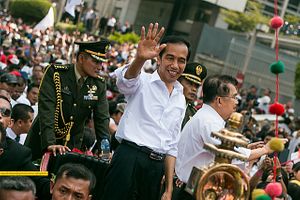Indonesia has recently been lifting its presence in the Pacific, courting a number of Pacific Island countries in an attempt to quell the region’s sympathies for the independence movement in the Indonesian province of West Papua.
A particular recent focus has been on boosting relations with a number of Micronesian states as a way of gaining influence in the Pacific Islands Forum (PIF). In July, the President of the Federated States of Micronesia (FSM) visited Jakarta, holding talks with President Joko “Jokowi” Widodo. Indonesia also has instigated plans to open a consulate in the FSM. Previously, Indonesian consular services in the region were run out of its Tokyo embassy. In February, an Indonesian cabinet minister was dispatched to Nauru for the tiny island’s 50th anniversary of independence, bringing with him a Papuan band. Both Nauru and Tuvalu have recently expressed support for Jakarta’s regional development programs in West Papua.
Beyond Micronesia, in April a delegation from the Melanesian state of Solomon Islands was invited to tour Indonesia’s West Papua and Papua provinces, which seems to have led to a review of Solomon Islands policy toward West Papua. Shifts in position toward the Indonesian province from Nauru, Tuvalu, and potentially Solomon Islands would be considered a significant victory for Jakarta, which previously accused these countries of “misusing” their platforms at the United Nations General Assembly to be critical of Indonesia’s policies in West Papua.
This increased Indonesian outreach comes during the ongoing deliberation over the application of the United Liberation Movement for West Papua to become a full member of the Melanesian Spearhead Group (MSG), an issue that seems to have divided the organization. In late-July the Director-General of the MSG stated that discussions on the situation in West Papua don’t belong in the forum. However, last week Vanuatu appointed a special envoy to the restive province.
Vanuautu remains the most staunch supporter of the West Papuan independence movement, and it is a sentiment held strongly by both political elites and civil society within the country. Former Vanuatu Prime Minister Sato Kilman, who was a driving force behind Indonesia gaining observer status to the MSG, was forced to resign from office in 2013 partly due to a public suspicion that he was too close to Indonesia. The then-incoming prime minister swiftly cancelled a defense agreement with Indonesia, which had Jakarta providing equipment and assistance to the Vanuatu police.
In 2013, with Fiji suspended from the Pacific Island Forum (PIF), Fiji’s then-military dictator, Frank Bainimarama sought to set up the Pacific Islands Development Forum (PIDF) as a competitor to the PIF. At the following year’s forum then-Indonesian President Susilo Bambang Yudhoyono (SBY) paid a three day visit to Fiji and delivered a keynote address to the PIDF, pledging $20 million over five years to climate change and natural disaster-proofing initiatives. Since then, Fiji’s opposition Social Democratic Liberal Party (SODELPA) has claimed Indonesia has given military support to Fiji in exchange for support for West Papua, and for Indonesia’s observer status in the MSG. The relationship between Fiji and Indonesia seems to be seen by Bainimarama has a potential bridge for Fiji into Asia, by-passing Australia, and for Indonesia, as a way to gain the support of one of the region’s more powerful actors.
The issue continues to create complexity within the Pacific’s Melanesian states. Recently Papua New Guinea Prime Minister, Peter O’Neill, has advocated the issue of West Papuan independence be taken to the United Nations decolonization committee. However, the land border that PNG shares with Indonesia has constrained its ability to forcefully advocate for the West Papuan cause. And PNG’s own secessionist movement in Bougainville also requires Port Moresby to tread carefully for fear of reciprocal interference in its own affairs.
For Indonesia the unity of its state remains non-negotiable. Yet sentiment within the Melanesian states (and throughout the wider Pacific) poses a threat to this unity. It also creates a unique contest to Indonesian sovereignty, emanating from outside Indonesia’s immediate area and based on ethnic solidarity, and therefore marking it as a distinct challenge when compared to the ongoing disputes over the placement of borders with Malaysia. It is a challenge that cannot be addressed with traditional hard power tools.
Indonesia has what Hugh White — writing in the latest issue of Australian Foreign Affairs magazine — has describe as a “curiously elusive strategic personality,” seemingly a desire to remain internationally aloof in order to avoid any entanglements. This makes it difficult to deduce just how Jakarta might proceed as its power develops. The country is projected to become the world’s fifth largest economy by 2040 (based on a continuation of current growth rates). Yet in the Lowy Institute’s new data map on Pacific aid, Indonesia is conspicuously absent, with the country having no official aid program, usually a key marker of power projection. The assistance Jakarta does currently provide is more ad hoc, seemingly based on at-the-moment political calculations, rather than a coherent policy structure.
For most of its existence Indonesia has remained focused on its internal complexities, yet the challenge to it sovereignty from the Pacific remains a constant irritant. Current moves to forge a wider engagement strategy with Pacific Islands states could be seen as both an attempt to subdue this irritant, and also a testing ground for Jakarta’s future power projection.

































